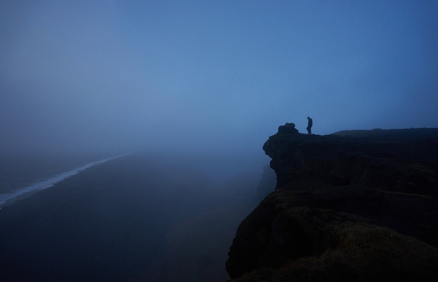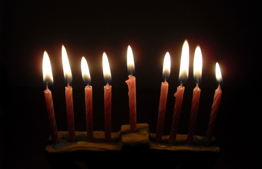Parashat Toldot: Yitzchak's Gevura in Gerar

Yitchak personifies midat hadin and gevura. These qualities are manifest in that he stands before G-d alone, and does not negotiate with the Philistines. This teaches us how to relate to our enemies on the national and personal levels. Where is the Biblical Gerar today?
.וכל הבארות אשר חפרו עבדי אביו בימי אברהם אביו סתמום פלישתים וימלאום עפר"
"ויאמר אבימלך אל יצחק לך מעימנו כי עצמת ממנו מאוד. וילך משם יצחק ויחן בנחל גרר וישב שם
"And the Philistines stopped up all the wells which his father's servants had dug in the days of his father Abraham, filling them with earth. And Avimelech said to Yitzchak: Go away from us, for you have become too big for us. So Yitzchak departed from there and encamped in the wadi of Gerar, where he settled." (Bereishit 26: 15-17).
Gevura with no backbone?
The fact that Yitzchak Avinu is commanded to stay in the Land of Israel and refrain from going down to Egypt does not make life easy for him. Similar to his father, he must hide the fact that Rivka is his wife. Despite Avimelech granting royal protection to the couple ("Anyone who molests this man or his wife shall be put to death"), and the tremendous Divine blessing ("And Yitchak sowed in that land and reaped a hundredfold the same year, and G-d blessed him"), this does not prevent the Philistines from being jealous of his success and persecuting him.
However, what is astounding here is Yitzchak's reaction. When Avimelech asks him to leave ("for you have become far too big for us"), he picks up and leaves. When the Philistines fight with him over the first well he digs, and then the second, he goes on to dig up a third well, over which there is finally no fighting. Thanks to this expansive relief (harchava) he calls the well Rechovot. What is so strange is that Yitzchak is generally perceived as the embodiment of midat hadin, the attribute of strict justice, expressed in the trait of gevura (inner strength, might). Yitchak's comportment throughout this whole saga doesn't seem to square with these traits, rather, on the face of it, reflects weakness.
Standing before G-d alone
It seems that gevura should be understood differently than the way we are used to. The deeper meaning of this trait is "going all the way," without giving in or taking other parties or aspects into consideration. Yitzchak Avinu does exactly this. Yitzchak understands that in truth, if a person harms us he is only a Divine messenger; it could be that he will be punished for his actions, but that is none of our business. Whatever happens to us, whether via man or by "natural forces," is what G-d decreed would happen. As a result, there is no need to respond or retaliate, and that is exactly what Yitzchak does (or, rather, refrains from doing).
However, at times it is G-d's will, as He instructs us in His Torah or through the prophets, to respond in one way or another. When we do respond, we should do so because it is G-d's will and in act in the manner G-d wants us to. For this reason, the natural results of our actions become irrelevant. Whether it is few against many, weak against strong—we just have to perform our duty, since the rest is up to G-d anyway.
On the national and personal levels
This is very true on a national level, as well. From the beginning of our national rebirth in our Land, G-d placed among us strips of rebellious groups in the form of the Arabs residents of Israel, who have adopted the name "Palestinians," after the Philistines. Despite the fact that they prefer to view themselves as the descendants of Yishmael son of Avraham, and not of the Philistines, the historical role of the Philistines then and the Palestinians today is one and the same: to ensure that the Jewish People fulfills its destiny.
For this reason, it is clear that the solution to the problem cannot be simply responding to the rebelling forces alone—regardless of whether it is with an iron hand or attempts to placate and appease. The primary focus needs to be on strengthening our bond with the One who placed the rebellious population here to begin with: G-d, Who uses the Arabs to help us stay on course. This doesn't mean that we don't have to react to their actions, since G-d does want us to react! However, our focus has to be that as part of strengthening our bond with G-d, we treat our enemies in the way G-d wants us to. In other words: the problem is not the Arabs, rather our relationship with G-d.
The same principle applies in the private sphere as well. King David, when fleeing from his son Avshalom, exemplified this point. When told he should execute Shimi ben Gera for cursing him, he refuses, saying: "G-d told him to curse David." At a different occasion, before David's death, he does command his son Shlomo to punish him for rebelling against the king—and this, too, is in keeping with G-d's will. However, in the heat of the moment, David found it correct to emphasize this point: the true issue lies not between himself and Shimi ben Gera, rather between him and G-d. David's incredible statement prompts the Seer of Lublin (zot zikaron 1) to sum the issue up as such:
One should be cautious of pride … and of anger … and never get angry at all at anyone … and it is good to remember that everything is from the Creator, blessed be He, as it is written (Chullin 7b): 'A person injures his finger below [on earth] only if they declare about him on high' even if this is caused by those who have free choice.
That is, whenever we have a problem with someone—be it one's spouse, a family member, friend, or neighbor, we need to internalize that the real issue is between us and G-d, and that the person in question is only G-d's messenger. And just like it is senseless to blame the hand dealing the blow, and view it as a separate entity from the person whose hand it is, there is no point in getting angry at the messenger, who we understand is just a messenger from G-d.
Gerar – Live in this Land
"גור בארץ הזאת ואהיה עמך ואברכך... וישב יצחק בגרר"
"Live in this land and I will be with you and I will bless you … and Yitzchak settled in Gerar" (Bereishit 26: 3,6)
Yitzchak's stronghold continues Avraham's stronghold
These verses clearly indicate that Gerar is a city at the border of the Land promised to our forefathers, since Yitzchak was warned not to leave it and descend to Egypt. Later in the story, Yitzchak leaves the city of Gerar and settles along the Gerar stream, which is found in the strip of land where Gerar is its capital (according to Da'at Mikra, Nachal Gerar defines the strip of land on the southwest, just as Nachal Mitzrayim [Nile Delta] serves as the natural border of Egypt and separates it from the Land of Israel). This means that the entire area surrounding Gerar is considered the Land of Israel.
Our Sages teach us that Avraham's walking through the length and breadth of Canaan is considered a chazaka, a stronghold. About Yitzchak's arrival in Gerar, the Or HaChayim writes: "And perhaps Avraham Avinu did not hold the Land of the Philistines the first time, which is why G-d wanted Yitzchak to take hold of is, which he did in the best way as he plowed and sowed." That is, Yitzchak, who arrived in Gerar because of the famine, took the opportunity to complete Avraham's stronghold. And he did so in an extraordinary way; not only did he walk through the land and live there, but he also worked its soil. There is room to discuss what exactly was the purpose of their stronghold, but it is clear that the varying degrees of obligation of the various areas in the Land of Israel are tied not to the stronghold of our forefathers, but rather to the two sanctifications of the Land of Israel: the first during the days of Yehoshua (the conquest of olei Mitzrayim) and the second in the time of Ezra (olei Bavel).
Since Ashkelon is considered by the majority of the Rishonim as the border of settlement for olei Bavel (in Second Temple times the sanctification took place primarily through settlement and not through conquest), the areas south of Ashkelon—the Western Negev and Gush Katif—were conquered only by olei Mitzrayim and not olei Bavel. Areas even further south may not even be considered within the boundaries of olei Mitzrayim, since the area of Jewish sovereignty did not then extend to these places. The areas sanctified only by the first sanctification (kedusha rishona) and not the second one, do have the sanctity of the Land of Israel, and the Land-related mitzvot apply there, but not fully. For instance, according to the Rambam, these areas require terumot and ma'aserot, and it is forbidden to work the land during the shemita year, but sefichin (self-seeding plants) are permitted. Rabbi Yehuda HaNasi exempted certain areas from the Land-related mitzvot altogether, since the majority of residents were gentiles (scholars view this step as an attempt to help the Jewish settlements survive in these areas), such as Beit She'an and Ashkelon. Remarkably, the Gerar area (known as Gerariki in Talmudic times) was never exempt from these obligations, and was not ever subject to the "impurity of the land of the nations" (tumat eretz ha'amim), as is the case in areas outside the borders of olei Bavel.
Prof. Yoel Elitzur in his book Makom Baparasha (on parashat Toldot) notes the Yerushalmi (Shevi'it 6:1) and Bereishit Raba (§52 and §64), which complement each other. Elitzur cites an explanation by his father, the late Prof. Yehuda Elitzur: the special quality of the land of Gerar, despite the fact that it is farther from Central Israel than is Ashkelon and that that most of its inhabitants were gentiles, was due to its noy ra, its harsh climate and difficult growing conditions. Because of its arid climate and sandy soil, the gentile's hold on it is weak, so their sovereignty over the area was insufficient to nullify the sanctity of the Land. Prof. Yoel Elitzur mentions, in this context, the fact that the Gush Katif settlements were situated on desolate, sandy soil, unworked by the Arabs because of this noy ra, as noted by the Sages. Only the true owners of this land knew how to turn this desolate strip of land into a lush, blooming garden.
Where is Gerar?
While some identify Gerar as deep in the Negev (Prof. Y.M. Grintz), and R' Sa'adia Gaon identifies it with the ancient city Halutza, according to most scholars Gerar is situated in the Western Negev. However, the exact location of this important city mentioned several times in the stories of our patriarchs, the site of G-d's sole revelation to Yitzchak recorded in the Torah, is unclear. Some propose that Gerar is located at Tel Gama, familiar to many as the last junction before the Kisufim checkpoint. Proponents of this opinion include British archeologist Flinders Petrie, who excavated the area, as well as Prof. Yehuda Elitzur. If so, the nearby stream should be called wadi Gerar, not wadi Besor, as it is known today. The foot of the Tel was the site of the Han Yunis Battle, which marked the beginning of the 400-year Ottoman rule over the Land of Israel. Today this identification is not as widely accepted. A different approach proposes Tel Haror, situated on the northern banks of wadi Gerar (we cannot infer the location of the city from the name of this stream, since it is a modern name; it does not attest to whether or not it is related to the Biblical wadi Gerar). At the Tel, adjacent to Moshav Shibolim, artifacts were discovered from the Canaanite period until the Persian period (when the Jews returned to the Land of Israel during the times of Shivat Tziyon, in the time of Ezra and Nechemia). The tel is named after the burial place of Abu Huraya, one of the disciples of Mohamad; Moslems identify his grave at the top of the tel, but it might also refer to the ancient name of Gerar.




